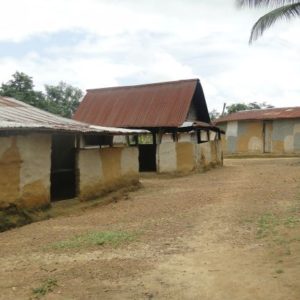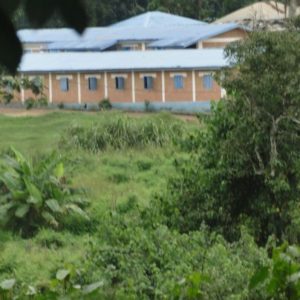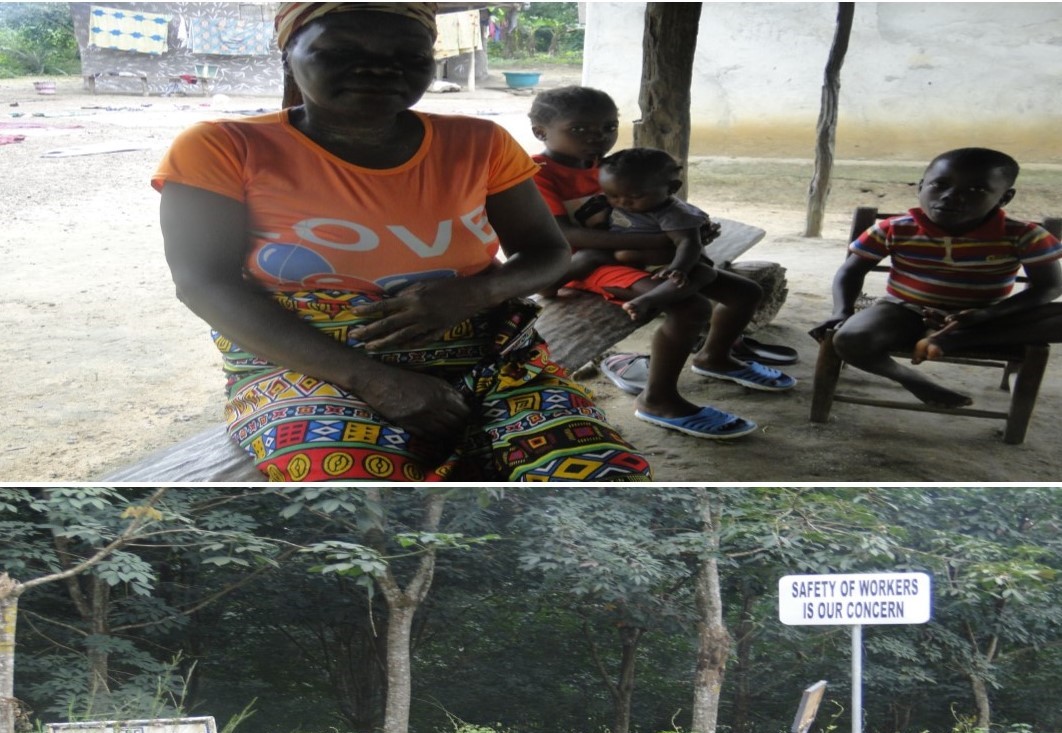PHOTO: Ma Kayma Siafa, one of the community people
By William Selmah and Edwin Fayia, III- www.newspublictrust.com
The managements of the Liberia Agricultural Corporation (LAC) and the Salala Rubber Corporation (SRC) have remained resistant to all attempts to have them make amends for corporate damages inflicted on indigenous communities in their expansion programs, a recent research study conducted by the Public Trust Media Group has established.
Destruction of towns, villages, sacred and burial sites, as well as, water and livelihood sources are among losses incurred by affected communities, when the two companies now owned and operated by the Europe based SOCFIN embarked on enlarging their farms in 1999 and 2007, respectively.
Though the two companies obtained concession rights since 1959, not much was heard about the struggles of the people directly affected by the operation of the companies under previous managements until the plantations were acquired by Socfin after the Liberian civil war. The farms have since been breeding grounds for conflict, partly because of Socfins’s aggressive expansion agenda, with little or no regard for the poor and hungry, as well as their rights to inheritance and survival.
Backdrop
“In 2013, SRC brought in bulldozers and dismantled all that belonged to us….We have been jailed on numerous occasions; at times spending up to 14 days without trial”, said Monue Stanley, an executive member of the Yeagbamah National Congress for Human Rights (YNCHR), a local advocacy group for affected indigenous communities. Their crime, he said, has most often simply been “speaking out” for their rights.

Partial view of Ansahta, one of the indigenous
settlements in the SRC area
YNCHR is one of the supporting organizations of the indigenous people that filed the complaint with the Compliance Advisor Ombudsman (CAO) of the IFC. Some of its members, including its founding Chairman, Abraham Kamara and Abraham Pennoh are documented victims of the struggle to redeem their land. They’ve suffered all sorts of attacks and reprisals against their persons and family members while standing up for the cause of affected citizens – who have been dispossessed of their livelihood.
Corporate Indifference
The study found that “Their [LAC and SRC] responses to the legitimate cries of the affected people have been one of disdain. In fact, local and international rights organizations who have mustered the courage to engage the plantation owners, have themselves been attacked in unequal measures.
In short, Socfin does not take kindly any scrutiny of their operations of the farms – a repressive regime of sort”.
In May 2019, 22 communities in Margibi and Bong Counties, represented by Green Advocates International (GAI) and other local partners, filed a complaint against SRC with the independent watchdog and accountability system of the International Finance Corporation (IFC), the Compliance Advisor Ombudsman (CAO). The complaint outlined a number of human rights abuses committed against the affected indigenous people including: land grab and forced eviction, lack of free prior and informed consent of the indigenous peoples, destruction of their ancestral graves and sacred sites, economic displacement and loss of livelihood, the pollution of their waters, poor employment conditions, and labor rights violations among other issues. The people also called attention to violations of national and international laws, as well as non-compliance with IFC’s Performance Standards.
Essentially, the IFC had granted a 10 Million USD loan for the rehabilitation and expansion of the plantation. CAO investigation team was dispatched to Liberia to determine the veracity of the complaint.
During the hearings, the company resisted and dismissed all allegations brought against it, including claims to the concession land by indigenous communities. The company argued that “deeds or tribal certificates of land within the Development Area dated after 1959 when the Concession Agreement was signed, held by individuals or groups, were ineffectual under Liberian Law because the Concession Agreement supersedes any subsequent grants to the title.” The Company told the assessment team that although notice was received from individuals and groups, claiming land within the Development Area, none of the deeds from the claims received pre-dated 1959, and no original documents were provided to verify the authenticity of the Registration Numbers with the Land Commission.
Communities desiring more and better
Findings from the survey also strongly suggest that the degree of commitment, fairness and transparency required of SRC and LAC to address issues surrounding destruction of crops, villages, towns, sacred grounds etc, raised by communities affected by their expansions, leaves more to desire. Consequently, trust and mutual respect between affected communities and citizens on one hand and SRC/LAC on the other is largely nonexistent.

A staff quarter shot from a distance
The study further adds, “this has diminished prospects for any smooth, peaceful resolution in the shortest possible time. It is even further compounded by the formation of groups such as the Yeagbahma National Congress for Human Rights (YNCHR) and Citizens Union (CU) in SRC, and Ablojay in LAC, all professing to be pressure groups, working for the affected communities. But in SRC, CU and YNCHR appear to work at variance with each other, which could potentially explore into a full-blown conflict between the two groups one day, to the disadvantage of the very “people” they claim to defend.
In a nutshell, the study found, SRC and LAC are yet to demonstrate the commitment and sincerity required to reach terms with affected communities.
The Town Chief of Dedee-Ta Amos Bainda, for example, said “we can’t trust SRC anymore my brother, because everything they tell us is not the truth. They have been meeting and meeting with us and promising this and that but not one they have done. The Citizen Union you just talked about is not in our interest. SRC put them together and after their inauguration, we wrote and told them that Citizen Union is not in our interest. We told them that we will not work with them because they are not there for us.”
It was not possible to get a copy of that letter, but there is a general feeling in the affected communities that CU is a proxy group. The companies have agents watching their backs in the communities. These agents feed them with information on anything they deem inimical to their (companies’) interests
During the conduct of this study, primary data collection setting was the plantation communities and environs. The questionnaires were administered in a random sampling format that captured voices of nearly hundred residents and stakeholders from selected towns and villages including Doakai Town, Kuwah-ta, Monkaytay-ta, Deede-ta 1&2 and Ansa-ta in SRC; whilst New Ceezon, Gbafein Town, Wonwoulu, Jenikpa, Zoeworlor and Gbocleon were visited in the LAC concession. Other voices from Monrovia and local community-based organizations, as well as select agencies of government are also inputted into the data collection process.
One common belief of displeased indigenous inhabitants and those of their kinsmen living outside the plantation is that the abuses being meted out to them by the corporate entities are all sanction by their government – past and present.
Gov’t-Corporate connivance
Affected communities do not see a clear line between LAC and SRC on one hand, and the Liberian Government and its actors on the other. They consider both as operating as a team.
In LAC, for examples, the team was told that “the Government of Liberia (GOL) is wearing LAC’s cap and LAC is wearing the government’s cap and that‘s how they have operated all through the years in afflicting our people,” said Dr. Albert Karnga, founder and Chairman of the Resilience Council of Elders, a pressure group for affected communities in LAC. “
The GOL is the protector of LAC. When you go against LAC, you have gone against the government”, Dr. Karnga said further. He claims that there were times LAC had local government officials including judges, superintendents and chiefs on its payroll.
The Resilience Council of Elders’ Chairman, who is now confined to a wheelchair, added that he has documents to authenticate his claims and promised to make them available on a return visit by the research team.
Dr. Karnga’s view that government is shield of the companies is shared by almost all of the community members.
According to the study, The multimillion-dollar investment by Socfin Group in SRC and LAC in Liberia should have actually be a blessing in the wake of the harsh economic realities in the country, has proven nothing more than a “pain-in-the-ass” largely for ordinary Liberians living in the concessions and surrounding areas.
The lingering conflict with the indigenous people could have been managed without much trouble only if Liberian authorities had struck a delicate balance between protecting the concessionaires and the investment on the one hand, and citizens and their inheritance and livelihood rights on the other.
Situations have changed between times, since the concession was granted in 1959. So, one would imagine that successive governments would have created room in the concession agreements for the greater good of not just the investors, but the general inhabitants. As it is now, the government appears to be subservient to the company, leaving the people vulnerable to scramble for life at the mercy of the powerful company.

